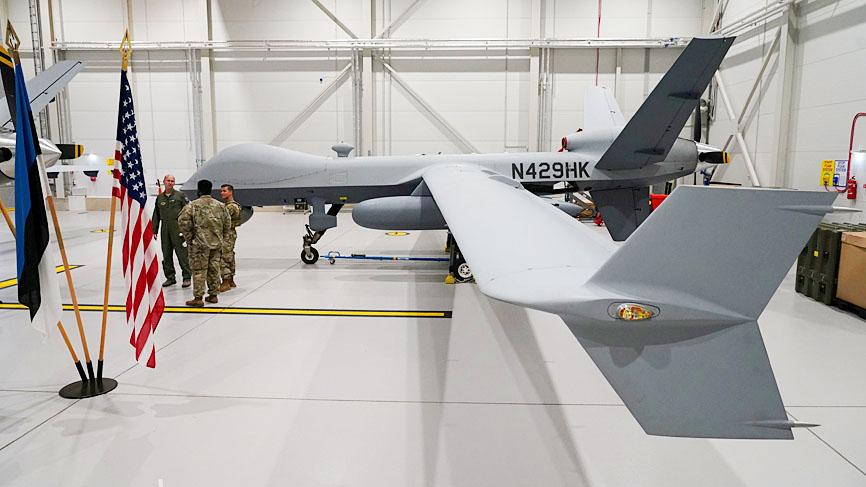The US is negotiating the sale of at least four sophisticated aerial drones to Taiwan for the first time, aircraft that can keep watch over huge swathes of sea and land, six US sources familiar with the negotiations said.
The SeaGuardian surveillance drones have a range of 6,000 nautical miles (11,100km), far greater than the 300km range of Taiwan’s fleet of drones, potentially giving the nation greater capacity to peer into China, observing its air force, missiles and other facilities.
While the US Department of State tacitly authorized the sale of the uncrewed aerial vehicles, two of the people said, it is not known whether the US officials have approved exporting the drones with weapons attached, one of them said.

Photo: Reuters
The deal must be approved by the US Congress, which might receive formal notification as soon as next month, two of the people said. Lawmakers could block a final agreement.
After reports about a possible drone sale, Chinese Ministry of Foreign Affairs spokesman Wang Wenbin (汪文斌) said that the US should stop arms sales to Taiwan to avoid affecting bilateral relations.
US arms sales seriously violate the “one China” principle, Wang told a daily news conference.
Republican and Democratic US senators on Thursday introduced legislation that would block the export, transfer or trade of many advanced drones to countries that are not close US allies — sales would be allowed to NATO members, Australia, Israel, Japan, New Zealand and South Korea.
A deal with Taiwan would be the first drone sale after US President Donald Trump’s administration moved ahead with its plan to sell more drones to more countries by reinterpreting an international arms control agreement called the Missile Technology Control Regime.
Taiwan’s military is well-trained and well-equipped with mostly US-made hardware, but China has a huge numerical advantage and is adding advanced equipment of its own, including stealth fighters, anti-satellite missiles and aircraft carriers.
Taiwan, which is bolstering its defenses in the face of what it sees as increasingly threatening moves by Beijing, early this year submitted its request to buy armed drones, one of the people familiar with the talks said.
The US last week sent Taiwan the pricing and availability data for the deal, a key step that denotes official approval to advance the sale, but it is non-binding and could be reversed.
A deal for the four drones, ground stations, spares, training and support could be worth about US$600 million, using previous sales as a guide.
There could also be options for additional units in the future, one of the people said.
In Taipei, the Ministry of National Defense declined to comment on the Reuters report, but Premier Su Tseng-chang (蘇貞昌), in response to media queries, reiterated the nation’s resolve to collaborate with like-minded nations to uphold regional peace, protect the nation’s sovereignty and ensure people’s safety.
At a time when the world is affected by COVID-19, the government hopes that China would focus on the health of its people and make contributions to slowing the virus’ spread, he said, adding that this is not the time for China to menace Taiwan with its warplanes and undermine regional peace.
The US has been eager to sell Taiwan tanks and fighter jets, but the deal to sell drones would be notable, as only a few close allies have been allowed to purchase the largest US-made drones.
The Taiwanese government has a fleet of 26 Albatross drones made locally by the Chungshan Institute of Science and Technology. The drones can fly 160 nautical miles (296km) — 80 nautical miles before returning to base — records kept by Bard College’s Center for the Study of the Drone showed.
General Atomics Aeronautical Systems Inc’s SeaGuardian has an airframe that can handle carrying weapons — but only if contractually allowed by the US government.
Additional reporting by Sean Lin

Two US House of Representatives committees yesterday condemned China’s attempt to orchestrate a crash involving Vice President Hsiao Bi-khim’s (蕭美琴) car when she visited the Czech Republic last year as vice president-elect. Czech local media in March last year reported that a Chinese diplomat had run a red light while following Hsiao’s car from the airport, and Czech intelligence last week told local media that Chinese diplomats and agents had also planned to stage a demonstrative car collision. Hsiao on Saturday shared a Reuters news report on the incident through her account on social media platform X and wrote: “I

‘BUILDING PARTNERSHIPS’: The US military’s aim is to continue to make any potential Chinese invasion more difficult than it already is, US General Ronald Clark said The likelihood of China invading Taiwan without contest is “very, very small” because the Taiwan Strait is under constant surveillance by multiple countries, a US general has said. General Ronald Clark, commanding officer of US Army Pacific (USARPAC), the US Army’s largest service component command, made the remarks during a dialogue hosted on Friday by Washington-based think tank the Center for Strategic and International Studies. Asked by the event host what the Chinese military has learned from its US counterpart over the years, Clark said that the first lesson is that the skill and will of US service members are “unmatched.” The second

STANDING TOGETHER: Amid China’s increasingly aggressive activities, nations must join forces in detecting and dealing with incursions, a Taiwanese official said Two senior Philippine officials and one former official yesterday attended the Taiwan International Ocean Forum in Taipei, the first high-level visit since the Philippines in April lifted a ban on such travel to Taiwan. The Ocean Affairs Council hosted the two-day event at the National Taiwan University Hospital International Convention Center. Philippine Navy spokesman Rear Admiral Roy Vincent Trinidad, Coast Guard spokesman Grand Commodore Jay Tarriela and former Philippine Presidential Communications Office assistant secretary Michel del Rosario participated in the forum. More than 100 officials, experts and entrepreneurs from 15 nations participated in the forum, which included discussions on countering China’s hybrid warfare

MORE DEMOCRACY: The only solution to Taiwan’s current democratic issues involves more democracy, including Constitutional Court rulings and citizens exercising their civil rights , Lai said The People’s Republic of China (PRC) is not the “motherland” of the Republic of China (ROC) and has never owned Taiwan, President William Lai (賴清德) said yesterday. The speech was the third in a series of 10 that Lai is scheduled to deliver across Taiwan. Taiwan is facing external threats from China, Lai said at a Lions Clubs International banquet in Hsinchu. For example, on June 21 the army detected 12 Chinese aircraft, eight of which entered Taiwanese waters, as well as six Chinese warships that remained in the waters around Taiwan, he said. Beyond military and political intimidation, Taiwan